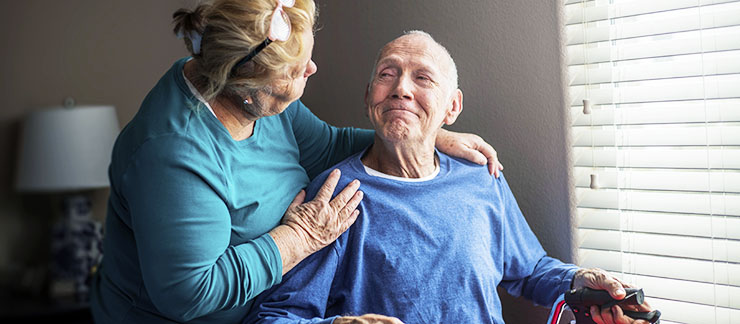
Lewy Body Dementia: What to Know
Lewy body dementia (LBD) is a brain disease that impairs thinking and often mobility. It is one of the most common types of dementia and affects more than one million people in the United States. LBD is still relatively unknown to many people and is often misdiagnosed or underdiagnosed in its earliest stages.
Learn what you need to know about Lewy body dementia and how professional home care can help a loved one with the disease.
What Causes Lewy Body Dementia?
LBD is caused by the buildup of abnormal protein deposits, called Lewy bodies, in the regions of the brain that are responsible for:
- Thinking
- Memory
- Movement
When Lewy body deposits accumulate in these regions, they damage brain cells and interfere with normal brain function.
What are the Symptoms of Lewy Body Dementia?
People with LBD may not experience every symptom associated with the disease, and the severity of symptoms can vary among individuals. Here are the most common symptoms:
- Changes in thinking and reasoning
- Pronounced memory loss
- Confusion, poor attention span, and visual-spatial difficulty
- Recurring hallucinations, which are most commonly visual
- Problems with sleep
- Depression, apathy, and other mood disorders
- Movement disorders, such as slowness, stiffness, and gait changes
- Problems regulating automatic body functions (autonomic nervous system), such as pulse and digestion
Regardless of how the disease begins, LBD is progressive and may eventually develop overlapping and worsening symptoms.
What are Risk Factors for Lewy Body Dementia?
While few risk factors have been identified, the following may increase the risk of developing LBD:
- Age: Individuals older than age 60
- Gender: Men are at a higher risk than women
- Family History: Individuals who have (or had) a family member with the disease
How is Lewy Body Dementia Diagnosed?
LBD is often confused with Alzheimer’s disease because each has similar signs. To determine if symptoms are related to LBD, a medical diagnosis is made after a thorough evaluation that includes:
- Physical exam
- Diagnostic testing
- Blood tests
- Brain scans
How is Lewy Body Dementia Treated?
Although LBD is not curable, some non-surgical treatments and therapies can help control and manage symptoms. A comprehensive treatment plan may involve:
- Medications to alieve cognitive and movement symptoms or hallucinations
- Physical, occupational, speech, or other types of therapy
- Individual and family counseling
- Support groups
Doctors may recommend non-drug approaches because certain medications can have side effects that could worsen other symptoms. Treatments are shown to be more effective the earlier LBD is recognized.
If you are concerned you or a loved one may have LBD, make an appointment with your doctor as soon as possible.
Home Care Assistance for Lewy Body Dementia is Available
As the effects of LBD continue to progress rapidly, family caregivers may become overwhelmed by the stress and burden of properly caring for a loved one. Professional dementia care can fill in the gaps and support individuals and their families. A qualified home care provider will help your loved one by:
- Reducing stress
- Preventing falls
- Managing symptoms
- Providing medication reminders
- Minimizing the threat of wandering
- Supporting independence
- Maintaining quality of life
Visiting Angels’ in-home caregivers can perform tasks such as lifting, bathing, running errands, and other essential responsibilities. If you’re concerned a loved one is unable to care for themselves following an LBD diagnosis, consider a Visiting Angels in-home care specialist. Our Visiting Angels care coordinators are available to discuss your loved one’s needs during a free home care consultation.


